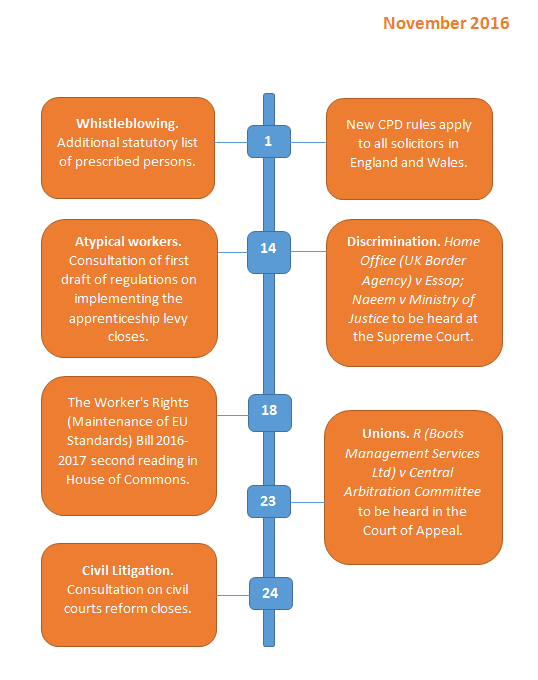Is the process of Brexit becoming clearer? The Prime Minister announced Article 50 would not be triggered before the end of March 2017 and the House of Commons library published a new briefing paper on the employment law implications of Brexit. For more information on the process of Brexit and the protection of employment rights following Brexit, see What to expect in employment law: Brexit.
October has also been a busy month for the courts. The Court of Appeal upheld the EAT’s decision in British Gas Trading Ltd v Lock and another that statutory holiday pay must include a representative element of result-based communication. The EAT held that the objective test under section 15 of the Equality Act 2010 in a claim for discrimination arising from disability means that, an employee’s treatment must be justified, not the employer’s underlying procedure. The EAT also found that an employment tribunal had jurisdiction to decide whether a settlement agreement which satisfied the requirements set out in section 203(3) of the Employment Rights Act 1996 was nevertheless unenforceable because the claimant had lacked the mental capacity to enter into it.
There were also some interesting decisions in the tribunals. A Scottish employment tribunal considered the compensation arising out of a discriminatory shared parental pay policy. An employment tribunal found that Easyjet’s roster practices were indirectly discriminatory towards two breastfeeding employees on the grounds of sex, and at a preliminary hearing, an employment judge has held that a predominantly female group of supermarket retail store employees can compare themselves with a predominantly male group of distribution depot employees for the purposes of an equal pay claim.
Staying in the employment tribunals, the President of the Employment Tribunals in England and Wales issued Presidential Guidance creating a process of judicial assessment, the aim of which is to assist settlement of litigation. While in the news, Acas called for gender pay gap reporting assistance, working practices at Asos warehouse were questioned, a new Scottish independence Bill was published, the Gig economy fell under the spotlight, and it was suggested that the government is set to miss the £9.00 an hour National Living Wage forecast.
In our blog, Sophie McGuinness questions the fairness of employment tribunal limitation dates in discrimination cases, Shireen Shaikh discusses the changing world of work, Marianne Tutin considers two recent EAT decisions that illustrate the difficulties with the interpretation of the extended definition of “worker” for whistleblowing purposes, and Kathryn Dooks, analyses the possibility of human workers becoming old tech due to artificial intelligence.
Next month
Key developments to look out for in November 2016.

For recent and forthcoming developments, don’t forget What to expect in employment law, Case tracker and Legislation tracker.



